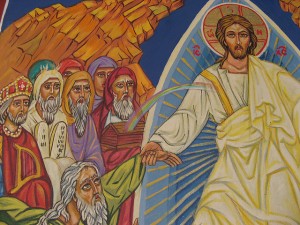Baptism and Prophecy
 In addition to sharing in Christ’s priesthood in baptism, the Catechism also tells us that we share in Christ’s prophetic office. The purpose of a Prophet (and hence Christ’s Office of Prophet) is something that is frequently misunderstood within Christianity today. The average answer will be that a prophet is essentially a divine fortune teller revealing the future (often in an incredibly cryptic fashion) or in the mold of a fire from heaven executor of God’s justice, such as in the case of the Prophet Elijah or in the Ten Plagues inflicted on Egypt. While these stories make for great entertainment, they miss the point of a prophet in the Biblical sense.
In addition to sharing in Christ’s priesthood in baptism, the Catechism also tells us that we share in Christ’s prophetic office. The purpose of a Prophet (and hence Christ’s Office of Prophet) is something that is frequently misunderstood within Christianity today. The average answer will be that a prophet is essentially a divine fortune teller revealing the future (often in an incredibly cryptic fashion) or in the mold of a fire from heaven executor of God’s justice, such as in the case of the Prophet Elijah or in the Ten Plagues inflicted on Egypt. While these stories make for great entertainment, they miss the point of a prophet in the Biblical sense.
In order to get a proper understanding of a prophet, we need to return to the calling of the first prophet in Scripture, Moses. Before the signs and wonders, before the plagues, God states that his purpose for Moses is one of mercy. (Exodus 2:25) Moses will be God’s instrument in rescuing His people (Exodus 3:7-10), freeing them from the oppression of bondage, and bringing them to freedom in a land where all their needs are provided for.
When the Prophet Isaiah arrives on the scene, it is not to announce some cosmic vision or execute justice, but to remind the Kingdom of Judah that even in their rebellion, they were still God’s chosen people, and that He still had great things planned for them. It is with this purpose that he announces to the wicked King Ahaz (Is 7:10-15) that even in spite of his wickedness, his royal line will continue, and that through this line the King of the World will be born. In describing that Messiah, his mission is described as follows (Is 61:1):
The Spirit of the Lord GOD is upon me; because the LORD hath anointed me to preach good tidings unto the meek; he hath sent me to bind up the brokenhearted, to proclaim liberty to the captives, and the opening of the prison to them that are bound.
When Christ walked the Earth, He proclaims Himself the fulfillment of that utterance, as through Him all of these things are provided. (Luke 4:18-21) Like Moses, Christ brings liberty to captives and comfort to those in mourning, leading them (through His Cross) to their destiny in Heaven.
When seen in that light, Christ’s prophetic mission takes on a whole new character, as does our involvement in it. Before Christ ascended into heaven, He charged His Apostles (and by extension all of us) to give His message of freedom and promise of paradise to every creature walking this Earth (Matthew 28:18-20), a paradise only possible through His Cross.
What are some concrete ways that Christians share in Christ’s office of prophet? I submit there is no better way to carry out the actions of Prophet than what we Catholics know as the Works of Mercy. When we carry out the seven works of corporal mercy, we do things such as ransoming captives, visiting and tending to the sick, and feeding the hungry, we are already fulfilling several of the things Christ claimed was the purpose of His ministry. When we perform the seven spiritual works of mercy, we do such things as forgiving the sins of others, bearing faults, counsel the doubtful and instruct the ignorant. Once again, these are the things that Christ explains as His purpose for coming to Earth.
When considering the role of a prophet, we must ask ourselves the following question: Why is any of this necessary? Without a prophet, God’s mercy is unknown to man. Today’s world is not too different from the time of Moses. The just and unjust Israeli alike cried out against the fundamental injustices of their situation. Today, even the wicked recognize deep down that there is something wrong with this world. All of humanity raises their question to the heavens (even without their knowledge), demanding to know of God why things are so unfair.
God sends the prophet to tell humanity that the injustices which exist were not meant to be such, and that they do not need to remain as such. God provides a way to right these wrongs, and it comes through following His way, which is through Christ Jesus and the Cross. The prophet is to give this message to the wicked and righteous alike, because it is ultimately not based on their merits that the message is given. God sends the prophet because he is merciful, and that mercy is meant for all of humanity. If prophecy remains a tool simply for the benefit of a favored group, prophecy becomes worthless.
That this message is to be given freely should also make us think deeply about prophecy. We must realize that prophecy is not based on our own message and brilliance, but on the message of the one who sends us. It is for this reason that John the Baptist was the greatest of prophets. His entire message could be summed up in one sentence, and it must become our mission as well. He must increase, I must decrease. (John 3:30.) May this always be our motto.

